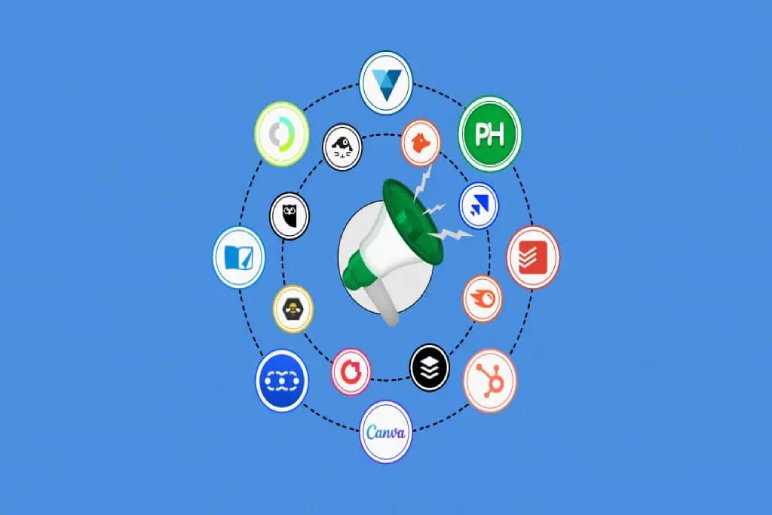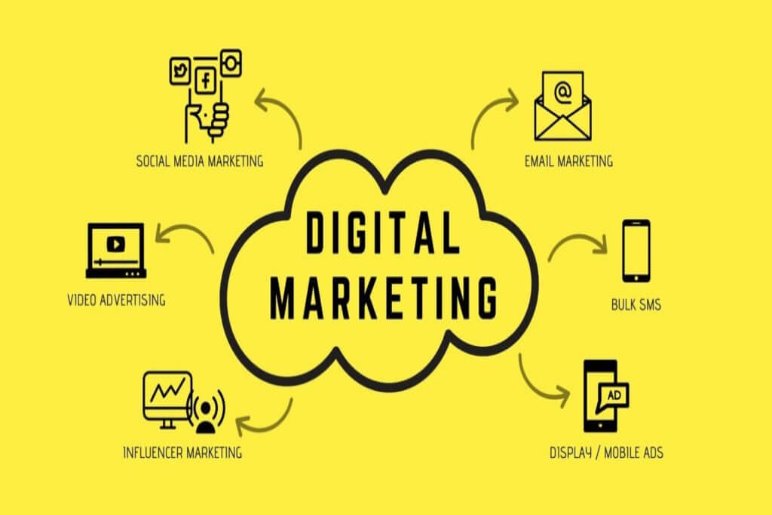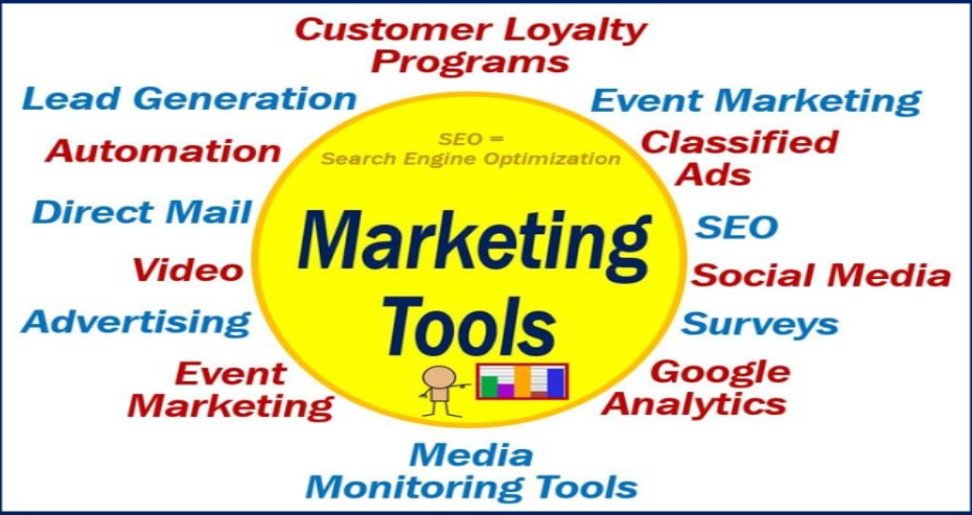In today’s digital age, businesses of all sizes rely on a vast array of marketing tools to connect with their target audience, build brand awareness, and drive sales. With so many options available, it can be overwhelming to determine which tools are essential for your business. This article will explore the different types of marketing tools, their functions, and how they can contribute to your overall marketing strategy.
Types of marketing tools

Below Some Marketing Tools and Explanation:
- Site checkers
Site checkers are digital tools designed to assess the health and performance of websites. They function by scrutinizing various aspects of a website, including its structure, content, speed, and security. These tools provide valuable insights into a website’s overall optimization, identifying areas for improvement such as broken links, slow loading times, poor mobile responsiveness, and SEO deficiencies. By leveraging site checker reports, website owners and developers can enhance user experience, improve search engine rankings, and boost website authority.
- Classified adverts
Classified adverts are concise, text-based advertisements typically arranged by category in print or digital publications. These short notices offer a cost-effective way for individuals and businesses to promote products, services, or opportunities. Traditionally found in newspapers and magazines, classifieds have evolved to include online platforms and mobile apps. Common categories include job postings, real estate listings, personal ads, and items for sale or wanted. They often employ abbreviations, symbols, and limited character counts to maximize space efficiency and minimize costs.
- Social media
Social media has revolutionized communication, transforming how we connect, share information, and consume content. These digital platforms enable individuals and communities to interact virtually, fostering relationships across geographical boundaries. From sharing personal updates and photos to engaging in discussions on diverse topics, social media offers a space for self-expression and connection. Businesses leverage these platforms for marketing, customer engagement, and building brand loyalty. While social media undoubtedly brings people closer, it also raises concerns about privacy, misinformation, and the impact on mental well-being, necessitating a balanced and mindful approach to its use.
- Internet marketing
Internet marketing is the strategic utilization of digital channels to promote and sell products or services. This encompasses a broad spectrum of online activities, including search engine optimization (SEO) to enhance website visibility, pay-per-click (PPC) advertising for targeted audience reach, content marketing to build brand authority, social media engagement to foster community interaction, email marketing for direct customer communication, and analytics to measure campaign performance. By effectively combining these tactics, businesses can attract, engage, and convert online audiences into loyal customers, driving growth and success in the digital marketplace.
- Surveys
Surveys are systematic methods of gathering data from a sample of individuals to understand the characteristics or opinions of a larger population. They typically involve a set of carefully crafted questions administered through various modes such as online platforms, paper questionnaires, or face-to-face interviews. Surveys serve as valuable tools for researchers, businesses, and policymakers to collect information on a wide range of topics, from market preferences and customer satisfaction to social attitudes and demographic trends. By analyzing survey data, insights can be derived to inform decision-making, identify trends, and measure the effectiveness of programs or interventions.
- Google Analytics
Google Analytics is a powerful web analytics tool provided by Google that offers comprehensive insights into website and app performance. It meticulously tracks and reports website traffic, user behavior, and conversions, empowering businesses to make data-driven decisions. By analyzing user demographics, interests, and acquisition channels, marketers can optimize campaigns, enhance user experience, and measure return on investment. Google Analytics goes beyond surface-level data, providing in-depth information on user interactions, allowing businesses to identify trends, uncover opportunities, and refine their digital strategies for maximum impact.
- Direct mail
Direct mail is a traditional yet effective marketing channel that involves sending physical promotional materials directly to potential customers through the postal service. This tangible approach allows businesses to deliver targeted messages to specific demographics, fostering a more personal connection than digital alternatives. Direct mail encompasses a variety of formats, from simple postcards and letters to elaborate catalogs and brochures. By leveraging data analytics, marketers can refine recipient lists, increasing the likelihood of reaching interested individuals. While direct mail may require a higher upfront cost compared to digital channels, its ability to generate tangible responses, such as coupon redemptions or product orders, makes it a valuable tool for many businesses.
- Media monitoring tools
Media monitoring tools are sophisticated software applications designed to systematically scan and analyze vast amounts of online and offline media content.
These tools empower businesses and organizations to track mentions of their brand, products, competitors, industry trends, and specific keywords across various platforms, including news articles, social media, blogs, forums, and broadcast media. By providing real-time alerts, sentiment analysis, and comprehensive reporting, media monitoring tools facilitate effective crisis management, reputation management, market research, and competitive intelligence. Essentially, they serve as indispensable assets for organizations seeking to understand and influence public perception.
- Customer loyalty programs
Customer loyalty programs are strategic initiatives designed to foster enduring relationships with customers by offering incentives for repeated business.
These programs typically involve accumulating points, earning discounts, or gaining exclusive access to products or services based on purchase history or engagement levels. By rewarding customer behavior, businesses aim to increase customer retention, boost sales, and cultivate brand advocacy. Effective loyalty programs provide tangible benefits to customers while generating valuable data for companies to understand consumer preferences and tailor offerings accordingly.
- Automation
Automation is the technological application of processes and systems to accomplish tasks with minimal human intervention. It encompasses a wide spectrum, from simple mechanical devices to complex computer-controlled systems. At its core, automation aims to increase efficiency, productivity, and accuracy by delegating repetitive or hazardous tasks to machines. This technological advancement has revolutionized industries, from manufacturing and agriculture to transportation and customer service. While it has led to job displacement in certain sectors, it has also created new opportunities and roles requiring human expertise in managing, programming, and maintaining automated systems.
More marketing tools and concepts

- Content Marketing Platforms
Content Marketing Platforms are software solutions designed to streamline and optimize the entire content lifecycle.They serve as centralized hubs for planning, creating, managing, distributing, and analyzing content across various channels. These platforms offer a range of features including content calendars, collaboration tools, asset management, publishing workflows, and performance analytics. By consolidating content-related activities, they enhance efficiency, improve team collaboration, and provide valuable insights to inform data-driven content strategies. Ultimately, content marketing platforms empower businesses to create high-quality, engaging content that resonates with their target audience and drives desired outcomes.
- Email Marketing Platforms
Email Marketing Platforms are specialized software tools designed to manage and execute email marketing campaigns. These platforms streamline the process of creating, sending, and tracking email communications to targeted audiences. With features such as contact management, email design templates, automation workflows, and performance analytics, they empower businesses to nurture leads, engage customers, and drive conversions efficiently. By automating repetitive tasks and providing valuable insights into campaign effectiveness, email marketing platforms optimize marketing efforts and contribute to overall business growth.
- CRM (Customer Relationship Management) Software
CRM (Customer Relationship Management) Software is a digital platform designed to streamline and enhance a company’s interactions with its customers. By consolidating customer data, such as contact information, purchase history, and communication records, CRM software provides a centralized hub for managing relationships. This unified view empowers businesses to understand customer needs, preferences, and behaviors more effectively. With features like sales pipeline management, marketing automation, and customer support ticketing, CRM systems optimize processes, improve efficiency, and foster stronger customer loyalty. Ultimately, CRM software helps businesses build lasting relationships, increase customer satisfaction, and drive overall business growth.
- Influencer Marketing
Influencer marketing is a strategic approach where brands collaborate with individuals who have cultivated a significant online following and influence within a specific niche.
These influencers, ranging from micro-influencers with dedicated communities to celebrities with vast audiences, act as brand ambassadors, promoting products or services to their followers. By leveraging the trust and authenticity influencers have built with their audience, brands can effectively reach and engage potential customers, increase brand awareness, and drive sales. This form of marketing has gained immense popularity due to its ability to bypass traditional advertising channels and connect with consumers on a more personal level, ultimately fostering stronger brand loyalty and advocacy.
- Video Marketing Tools
Video Marketing Tools are essential for creating, editing, distributing, and analyzing video content. These digital platforms offer a vast array of features, from basic video editing and trimming to advanced tools for animation, visual effects, and color correction. Beyond creation, they facilitate efficient video hosting, sharing on social media, and tracking viewer engagement. Additionally, many tools provide in-depth analytics to measure video performance, allowing marketers to optimize their content strategy based on audience behavior. Whether you’re a seasoned videographer or a beginner, the right video marketing tools can significantly enhance your content’s impact and reach.
- Affiliate Marketing Platforms
Affiliate Marketing Platforms are digital intermediaries that connect businesses (advertisers or merchants) with individuals or organizations (affiliates) who promote their products or services in exchange for a commission. These platforms provide the technological infrastructure to manage the entire affiliate program, including tracking sales, generating affiliate links, calculating commissions, and providing performance analytics. They offer a range of features to streamline the process for both advertisers and affiliates, such as payment processing, fraud prevention, and customizable reporting. By centralizing these functions, affiliate marketing platforms facilitate efficient partnerships and help maximize revenue for all parties involved.
Read More :
Featured Image Source: https://tinyurl.com/3zwfjyp2

